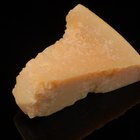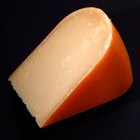That thick rind of bright red, black or yellow wax encasing your favorite cheese is not just there for decoration. All cheeses must undergo an aging period to bring out their full flavor. Mild cheeses such as brie are aged for two to four months, while drier and more intensely flavored cheeses such as Swiss are aged for about 14 months. Many cheeses are sealed in wax during this aging period to retain moisture and inhibit the growth of mold while they ripen to their flavorful peak. Once the rind has been cut into, the cheese's protection has been breached, exposing it to the risk of drying out or developing mold if it's stored incorrectly. Storing waxed cheeses properly helps keep them fresh and delicious.
Uncut Cheese Wheels
Certain cheeses have been known to last for decades when left uncut. The best temperature for storing waxed cheeses is 52F to 56F. Turn the cheese over once a week to keep moisture from settling on the bottom. Keep your cheese wheels out pf direct sunlight to keep the wax from softening too much.
Cut Cheese Wheels
Waxed cheese wheels that have been cut into should be stored in your refrigerator or freezer. This inhibits the growth of mold and helps the cheese retain its optimal flavor and texture. An opened wheel of cheese will stay fresh in your refrigerator for three to four weeks and in your freezer for up to six months. Thaw frozen cheese in the refrigerator rather than on the counter. Some types of cheese, such as cheddar, may exhibit changes to their texture when frozen and thawed. That doesn't mean they have gone bad, but the crumbly texture is best suited for use in soups or sauces where they will be fully melted.
Storage Options
There are almost as many storage options for cheeses as there are flavors. You can pop your waxed cheese wheel into a reusable, airtight plastic container with a lid, tuck it into a plastic zipper bag, wrap it in plastic cling wrap or in aluminum foil. Parchment paper also works well for cheeses with waxed rinds. Specialty cheese papers are available in gourmet stores and online, but are not strictly necessary.
Related Articles

Facts About Gouda Cheese

Does Blue Cheese Spoil?

How to Freeze Cheeses

Pecorino Cheese Nutrition
Can I Eat My Cheddar Cheese Past the ...

How to Tell if Mozzarella Is Bad

Aged Cheeses That Do Not Melt

The Difference Between Fresh Cheese & ...

Why Do Cheeses Brown When Placed Under ...

What Happens to Cream Cheese if It's ...

What Good Bacteria Is in Cheese?

Does a Sliced American Cheese Product ...

Which Cheeses Go With Honey Ham?

How to Store Parmigiano Reggiano

How to Store Cheese

How to Store Parmesan Cheese

What Is Animal Rennet?
How to Pan-Fry Cheese

How to Freeze Dry Sliced Salami

How to Age Cheese at Home
References
Writer Bio
Brynne Chandler raised three children alone while travelling, remodeling old homes, taking classes at the Unioversity of California Northridge and enjoying a successful career writing TV Animation. Her passions include cooking, tinkering, decorating and muscle cars. Brynne has been writing fun and informative non-fiction articles for almost a decade. She is hard at work on her first cookbook, which combines healthy eating with science-based natural remedies.